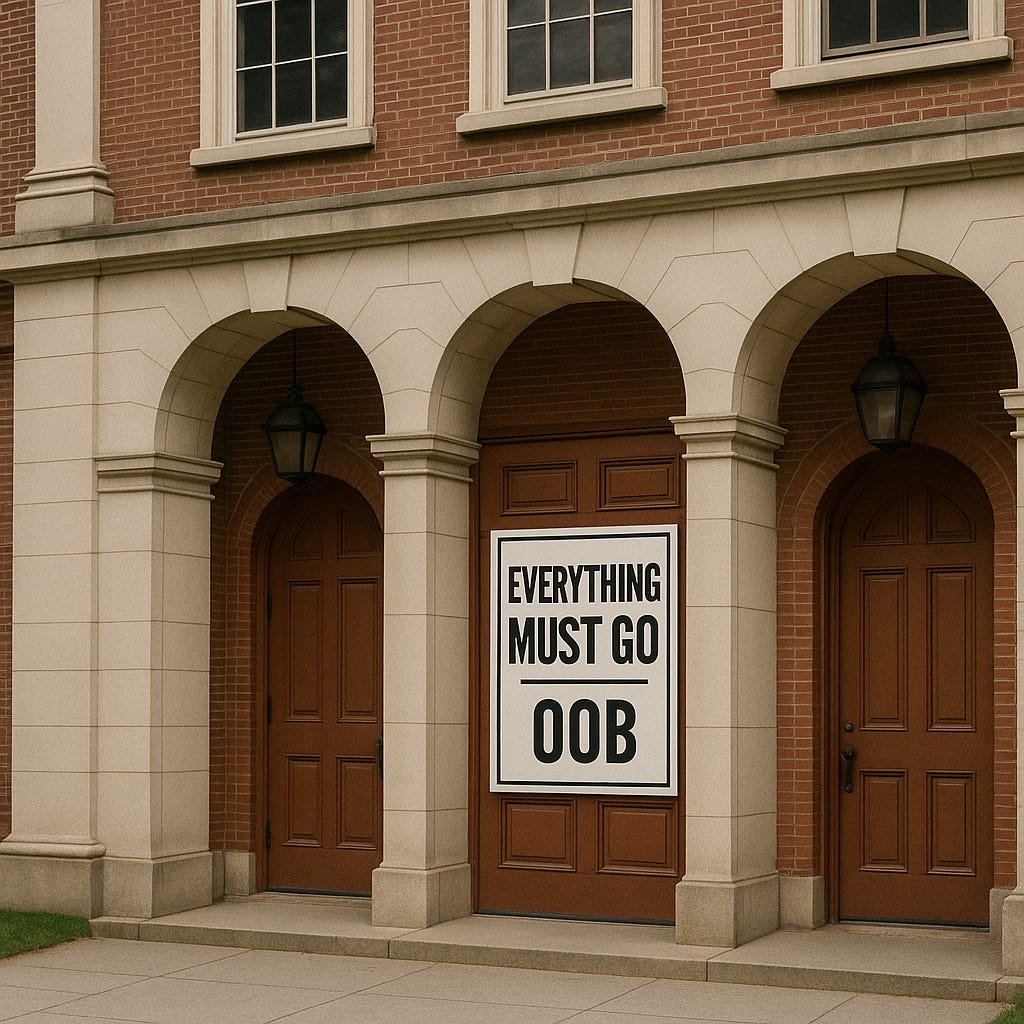The Collapse of Grievance Studies
When the Jobs Go Away
Preface: On Reader Participation
This piece experiments with form. It invites the reader into the process instead of hiding it. The three opening grooks each strike the same theme from a different angle — irony, reflection, and restraint — like light shifting across the same surface. By the time you’ve chosen your favorite, you’ll know exactly where the essay is headed. Comprehension is a good thing.
The goal isn’t just persuasion; it’s collaboration. Humor and rhythm do the work that footnotes can’t. The Collapse of Grievance Studies isn’t meant to be read — it’s meant to be played, one tonal choice at a time.
The Collapse of Grievance Studies: When the Jobs Go Away
By Jim Reynolds | www.reynolds.com
Here are three short grooks—each looks at the same subject from a slightly different light. By the time you’re grooked out, you’ll understand exactly what this essay is about. Pick the one that fits your morning (or afternoon) coffee.
Grook Options: Choose Your Opening Tone
The Grievance Machine
They mined the fault lines for a fee,
And called the tremors “equity.”
They preached that guilt could purify,
Then billed the world to testify.
But every creed that feeds on fear
Consumes itself when truth draws near.
The last complaint was right, it seems —
They’re victims now—of their own schemes.
The Credential Orchard
They planted doubt and called it thought,
Harvested guilt for what it bought.
They sold new sins to wash the old,
And found repentance pays in gold.
But faith in grievance doesn’t last,
When tithes dry up, the priest is past.
The pulpit’s gone, the flock dispersed—
They’ve run out of privilege to reverse.
Equity’s Echo
They shouted fairness through a mic,
Until it fed back what they like.
Each claim of pain, a polished brand,
Each wound a mark of higher stand.
But truth resists the scripted plea—
It fades the louder cries of “me.”
Now silence hums where slogans stood—
A sound suspiciously like good.
For years, universities and corporations built an entire economy on grievance. It wasn’t about equality or justice; it was about jobs — for people who produce none. The DEI boom created a parallel marketplace for professional resentment: departments that found fault with America supplying graduates who made a living amplifying it. Now, the money’s drying up, the fear is fading, and the whole supply chain of sanctimony is starting to collapse.
The truth is simple: there was never real demand for any of this. It was forced demand — manufactured in boardrooms where cowardice dressed itself up as conscience. Corporate executives, terrified of bad press, built sinecures for people whose only skill was spotting invisible offenses. University administrators, smelling the money, built departments to feed the same racket. The result was a closed feedback loop: grievance studies created the activists, DEI offices hired them, and HR bureaucracies kept them funded — all to protect institutions from charges no one ever proved.
But fear doesn’t last forever. Companies are discovering that diversity commissars don’t increase profits; they increase paranoia. Public universities, under budget pressure, are cutting the softest tissue first. Private colleges, seeing donors flee, are quietly “restructuring” their identity departments into oblivion. The moral panic that built this empire of entitlement is collapsing under its own uselessness.
Here’s the irony: DEI always claimed to empower the marginalized — yet it created the most privileged class of all. The grievance professional never risked anything. They weaponized other people’s discomfort for personal comfort, turning struggle into salary. Their moral currency only worked in a culture of guilt. Once the public stopped apologizing, their invoices stopped clearing.
When the DEI offices close, what happens to the degrees that fed them? Where does the “Critical Self-Reflection Major” go when there’s no diversity department waiting to hire them? The cruel truth is: nowhere. These fields were never designed to solve problems — only to extend them. They can’t survive in a world that’s no longer afraid of being called names.
Some of the faculty see what’s coming. Applications to gender studies and “social justice education” are plunging. Students are voting with their tuition — toward fields that produce, build, and create. That’s how it should be. The marketplace of ideas, long frozen by intimidation, is thawing. When the DEI scaffolding collapses, the fake load-bearing beams of academia will come down with it. Not through violence or decree — just disinterest.
It’s poetic, really. The departments that made a living crying “systemic inequality” are dying of systemic irrelevance. The revolution ate its own funding. They told us merit was oppressive; turns out incompetence is expensive.
And this is where it gets interesting: the cultural pendulum doesn’t just swing back — it resets standards. Real diversity returns, not as mandate but as merit. Instead of bean-counting identities, we’ll rediscover individuals. Instead of training people to police language, we’ll hire those who can actually build, teach, and think. Civilization reboots itself when it tires of pretending.
The grievance economy was always a luxury good — an indulgence for prosperous societies that mistook guilt for virtue. Now the indulgence is over. Companies can no longer afford moral theater. Universities can no longer afford academic welfare. And the loudest critics of capitalism are about to find out what the free market really feels like.
Pick a Button Line
Which one fits your mood today?
1. Moral Inevitable: When the grievance stops paying, the grievance stops mattering.
2. Bob-style Irony: Turns out the system wasn’t oppressive — just over-staffed.
3. Wry and Final: In the end, every grievance department is self-canceling. (Good one!)
4. Mock-Biblical: And on the seventh year, the grievance rested.
5. Corporate Autopsy: The Diversity Industrial Complex didn’t collapse — it was downsized for cause.



